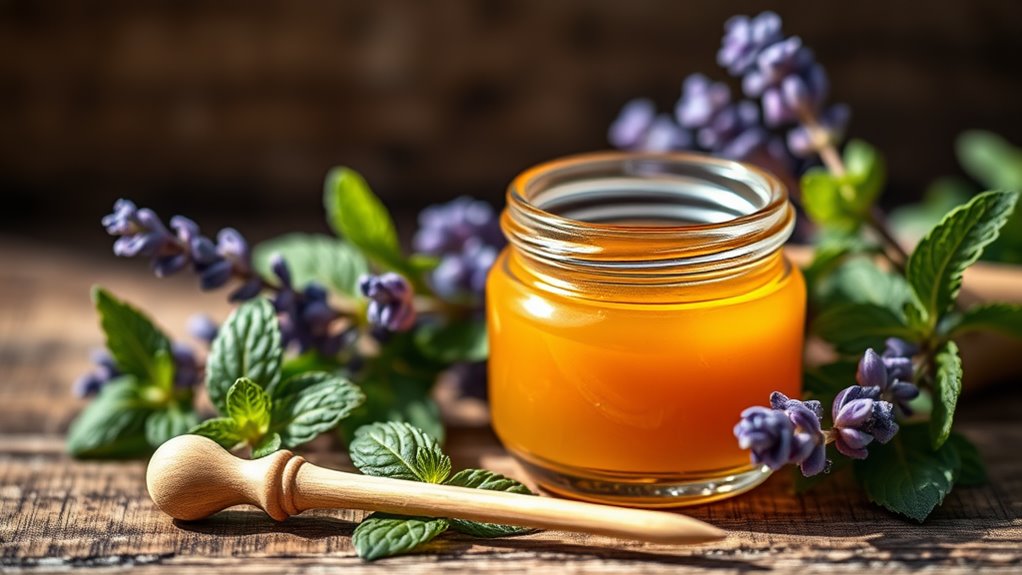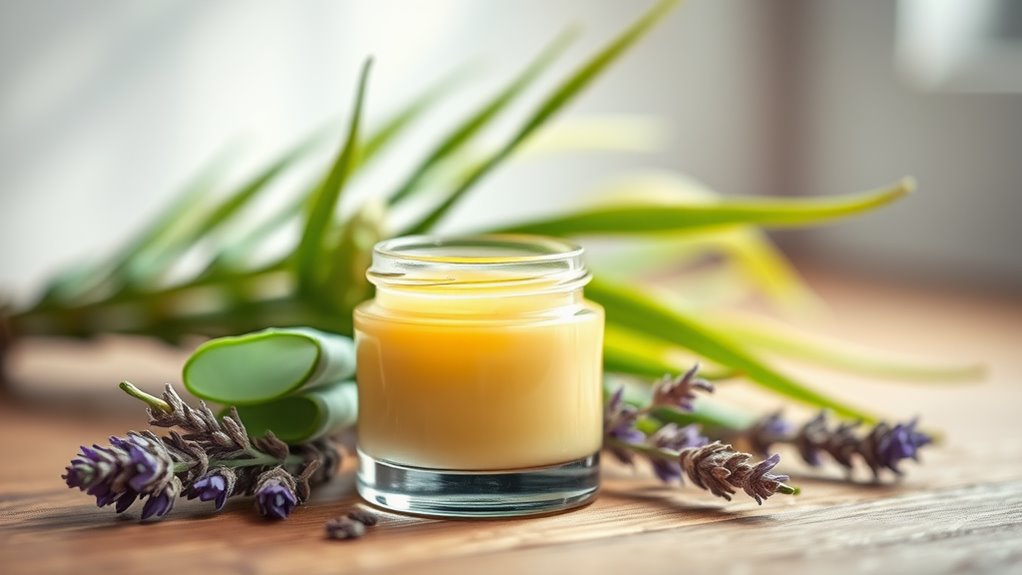Natural Help for Coughing Kids You’ll Want to Try
When your child is coughing, it’s natural to feel concerned and seek effective solutions. Fortunately, there are several gentle, natural remedies you can try. From soothing honey to calming herbal teas, these methods can provide relief without harsh side effects. You might also consider steam inhalation and humidifiers for congestion. Each option offers unique benefits that can support your child’s recovery. Curious about how to implement these remedies effectively?
Key Takeaways
- Offer one to two teaspoons of honey to children over one year old to soothe throats and reduce coughing.
- Serve warm herbal teas like chamomile or slippery elm to calm irritation and provide hydration.
- Utilize steam inhalation or a humidifier to moisten airways and ease breathing difficulties.
- Encourage increased fluid intake, including fruit-infused waters, to support mucus clearance and hydration.
- Prepare nutritious soups or broths, adding garlic and ginger for enhanced anti-inflammatory benefits and comfort.
Honey: A Sweet Soothing Remedy
When your child is coughing, it can be distressing for both of you. One effective cough remedy for kids is honey.
Studies show that honey can soothe irritated throats and reduce coughing, especially at night, leading to better sleep.
You can give your child one to two teaspoons of honey, but remember, it’s not suitable for children under one year old due to the risk of botulism.
Make sure to consult your pediatrician if you have concerns.
Incorporating honey into warm water or herbal tea can also enhance its soothing effects, making it a sweet, natural choice for relief. Additionally, combining honey with ginger’s anti-inflammatory properties can provide extra comfort for your child’s throat.
Herbal Teas to Relieve Coughing
Herbal teas can provide gentle relief for your child’s cough, using ingredients known for their soothing properties.
You’ll find several safe herbal options, like chamomile and ginger, that can ease discomfort. Sipping warm herbal tea is a comforting ritual for both you and your child, making it an enjoyable way to help alleviate cough symptoms.
Preparing these teas is simple and enjoyable, making it a comforting ritual for both you and your child.
Soothing Ingredients for Coughs
Coughing can be distressing for both kids and parents, but certain herbal teas offer soothing relief.
When choosing herbal teas, consider these key ingredients:
-
Chamomile – Known for its calming properties, chamomile can help relax your child’s throat and reduce irritation.
-
Throat Coat Tea – Often containing slippery elm, this tea forms a protective layer that soothes the throat and eases coughing.
-
Peppermint – This herb can open airways and provide a cooling effect, making it easier for your child to breathe comfortably.
Incorporating these soothing herbal teas can be a gentle, supportive approach to alleviating your child’s cough.
Safe Herbal Options
How can you effectively support your child’s recovery from a cough?
Safe herbal teas can be a gentle, effective remedy.
Consider options like chamomile, known for its soothing properties, or slippery elm, which can help coat the throat.
Marshmallow root is another excellent choice, as it soothes irritation and promotes hydration.
Honey, while not an herb, can enhance these teas and add a natural sweetness, but remember, it’s only safe for children over one year old.
Always consult your pediatrician before introducing herbal remedies to make sure they’re appropriate for your child’s specific health needs and circumstances.
Preparation and Serving Tips
When preparing herbal teas to relieve your child’s cough, it’s important to focus on both the brewing process and the serving method to maximize their effectiveness.
Here are three key tips:
- Choose Quality Ingredients: Opt for organic herbs like chamomile, thyme, or ginger to guarantee safety and potency.
- Proper Brewing: Steep the herbs in hot water for at least 5-10 minutes to extract beneficial compounds.
- Serve Warm: Offer the tea lukewarm, possibly with honey (if your child is over one) to soothe the throat and enhance flavor.
These steps can help provide comfort and relief for your little one during coughing episodes.
Steam Inhalation for Congestion Relief
Steam inhalation offers a soothing remedy for kids struggling with nasal congestion. By breathing in warm, moist air, your child can experience relief from swelling and irritation in their nasal passages. Here are some benefits to note:
| Benefit | Description |
|---|---|
| Eases Breathing | Helps open airways, reducing discomfort. |
| Loosens Mucus | Thins mucus, making it easier to expel. |
| Promotes Relaxation | Creates a calming environment for your child. |
To safely perform steam inhalation, supervise your child closely, ensuring they’re at a safe distance from hot water. It’s a simple, effective way to support their recovery. Additionally, steam inhalation moistens nasal passages and can help alleviate symptoms of sinus pressure.
Humidifiers: Keeping the Air Moist
Using a humidifier can greatly improve your child’s comfort by adding moisture to the air, which helps relieve coughing and congestion.
When choosing the right humidifier, consider factors like room size and maintenance needs to guarantee it effectively meets your family’s requirements. Understanding these benefits will guide you in creating a healthier environment for your little one. Additionally, using a humidifier can help maintain optimal air moisture levels, which is crucial during dry air seasons to prevent congestion.
Benefits of Humidified Air
Humidified air can greatly ease your child’s cough, especially during dry winter months or in arid climates.
Here are three benefits of using humidified air:
-
Soothes Irritated Airways: Moist air helps to reduce throat irritation, making it easier for your child to breathe comfortably.
-
Loosens Mucus: Humidity can thin mucus, promoting easier expulsion and relieving coughing fits.
-
Strengthens Immune Response: Proper humidity levels can help maintain healthy nasal passages, supporting your child’s immune system against infections.
Using a humidifier can provide significant relief, making it a valuable tool in managing your child’s cough effectively.
Choosing the Right Humidifier
Finding the right humidifier can make all the difference in alleviating your child’s cough. Consider factors like room size, type of humidifier, and maintenance requirements. Here’s a quick comparison to help you decide:
| Type | Pros | Cons |
|---|---|---|
| Cool Mist | Safe for kids, soothing | Requires regular cleaning |
| Warm Mist | Kills germs, warms air | Can be hot to touch |
| Ultrasonic | Quiet, energy-efficient | May leave mineral residue |
| Evaporative | Self-regulating, no over-humidifying | Needs filter replacement |
| Steam Vaporizer | Instant relief, hot steam | Not safe for young kids |
Choose wisely for your child’s comfort.
Essential Oils for Natural Cough Relief
Essential oils can serve as a soothing remedy for children struggling with coughs.
These natural extracts may help alleviate symptoms and promote comfort.
Here are three effective options to evaluate:
- Eucalyptus Oil: Known for its ability to clear nasal passages, it can ease breathing when diffused.
- Peppermint Oil: With its menthol properties, it can provide a cooling effect and soothe throat irritation.
- Lavender Oil: This calming oil may help your child relax, which can indirectly support recovery.
Additionally, using essential oils in a diffuser can help maintain bedroom humidity levels that soothe airways.
Always dilute essential oils properly and consult your pediatrician before use to guarantee safety for your child.
Warm Broths and Soups for Comfort
How can a simple bowl of warm broth or soup provide comfort for coughing kids? Warm liquids help soothe irritated throats, hydrate, and provide essential nutrients. Plus, the steam can ease congestion, making breathing easier. Incorporating ingredients like honey and ginger can further enhance the soothing effects of these warm dishes.
Here’s a quick comparison of popular broths and soups:
| Type | Benefits | Suggested Add-ins |
|---|---|---|
| Chicken Broth | Anti-inflammatory, rich in minerals | Garlic, ginger |
| Vegetable Soup | Packed with vitamins, boosts immunity | Spinach, carrots |
| Bone Broth | Supports gut health, collagen source | Herbs, spices |
Incorporating these can enhance comfort and recovery.




